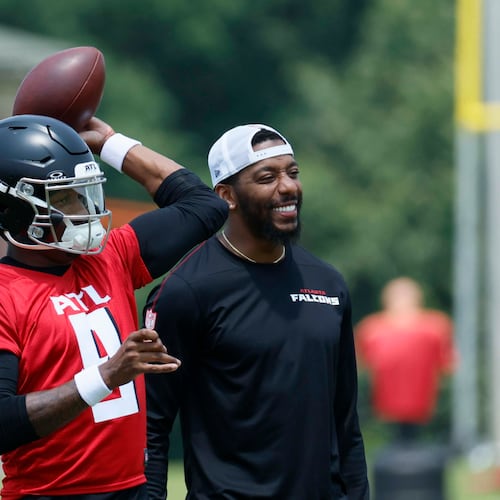The last time FBI and the Falcons were mentioned in the same sentence, federal authorities were closing in on the team’s quarterback and his dogfighting ring.
In the post Michael Vick era under general manager Thomas Dimitroff and coach Mike Smith, they are talking an entirely different language when they bring up the term “FBI.”
That’s scouting terminology for “Football Intelligence.”
They want bigger, stronger and faster football players. But they also want players with a high “FBI” score to deal with the week-to-week complexities of game plans and to avoid bone-headed plays that lead to penalties.
Before the scouting staff is sent to evaluate and do backgrounds checks on players, they formulate plans on how to evaluate the players’ FBI.
“It’s something you can’t really evaluate when you’re just watching tape because you don’t always know what the players are being taught to do,” Smith said. “But it is something that is very important.”
Dimitroff brought most of the system with him from New England and has infused Smith’s notions of how he would like his players to execute schemes.
“Everyone just thinks that football is just a physical game, but there is a lot of things that take place in a play that are non-physical,” Smith said. “Player’s intelligence and his ability to retain information is important.”
With nearly a roster full of players that have been vetted for FBI, the Falcons execute complex games plans on offense, defense and special teams.
The current offense has multiple formations, and players shuttle in and out on just about every play, depending on the down and distance.
The defense’s ability to confuse some of the game’s top signal-callers this season was stunning. Defensive coordinator Mike Nolan baited the great Peyton Manning into throwing three interceptions to a defense that he thought he had properly gathered a pre-snap read on.
“You have to have guys who can first understand the overall system, but there are subtle adjustments each and every week based on who you are playing, who’s healthy and who’s not healthy,” Smith said. “I think that part of it is very important. Not only can you learn the overall system, but can you learn the subtle adjustments that are going to take place throughout the week and even on game day.”
After the Falcons identify players they may be interested in drafting, they then try to get an accurate FBI score. The scouts file their reports with the initial tests results. Then the coaching staff takes over at the NFL scouting combine.
In addition to taking intelligence tests such as the Wonderlic, the Falcons have their own methods for prospects.
“I remember meeting with (offensive line) coach (Paul) Dunn at the combine,” guard-tackle Mike Johnson said. “He wanted to go over two or three plays. We didn’t have a lot of time together. He just wanted to go over some basic power plays and just kind of get a grasp of how I felt about them, how we might have differed from the way they ran them.”
If the player shows enough aptitude, he’s invited to Flowery Branch for a private workout. Johnson passed his quickie combine test and got an invitation for a workout and more testing.
“I could remember going in there with (former line coach Paul) Boudreau and coach Dunn and meeting with (former offensive coordinator Mike) Mularkey on the chalk board,” said Johnson, who was a third-round pick in 2010. “It was just them throwing some things at me and seeing how much I could retain within an hour or two.”
Johnson believed the coaches were trying to see how fast he could learn plays and make adjustments.
The coaches decide how vigorously to test the prospect based on the scouting reports.
“The scouts have a very good feel,” Smith said. “They’ve spent more time working up the players in terms of evaluating him, not only physically and medically, but also his intelligence based on what their grade is.”
Defensive tackle Corey Peters impressed the coaching staff with his knowledge of the game. He was selected in the third round of the 2010 draft, too.
“There was definitely a wide variety of questions in the interview process,” Peters said. “We definitely got on the board. We talked about a lot of different things.”
Safety Thomas DeCoud, who played at California, was elated to show the coaches what he knew before the 2008 draft.
”As a safety, you have to show that you know the intricacies of your defense,” DeCoud said. “They just want to know that you can comprehend a system and be able to regurgitate it more or less. It’s more a less of an aptitude test to see your ability to retain information and be able to explain it coherently.”
With a high FBI, the Falcons were able to set NFL records for the fewest accepted penalties and penalty yards.
The Falcons were penalized 55 times for 415 yards. The previous record for fewest penalties in a season was 57, set by the Patriots in 2008. The previous record for fewest penalty yards in a season was set by the 2007 Seahawks with 428.
The previous franchise record for penalties was 58 by the 2010 team.
Now, when the Falcons and FBI are mentioned in the same sentence, it’s not necessarily a bad thing.
About the Author
Keep Reading
The Latest
Featured


